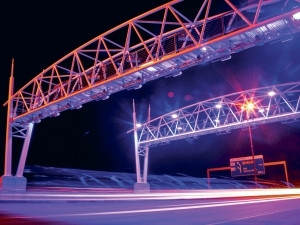
The legitimacy of e-toll numbers advertised by the SA National Roads Agency (Sanral) is once again in question, after transport minister Dipuo Peters revealed registration numbers in Parliament yesterday.
According to Peters, 912 048 e-toll registrations had taken place by the beginning of February, of which 49 987 were for local, provincial and national government vehicles.
Justice Project SA (JPSA) says the latest figures makes a mockery of recent statements made by both Sanral and the state-owned entity's CEO, Nazir Alli. JPSA chairperson Howard Dembovsky says a significant proportion of the registrations Peters speaks of applies to vehicles exempted from paying e-tolls.
There is a select group of emergency and law enforcement vehicles and taxis that government places under "commuter public transport" that are excused from paying the e-road tax.
Inflated assertion?
About two weeks ago, Alli said about 1.2 million e-tags had been taken up, with over 500 000 individual vehicles registered since e-tolls went live on 3 December - just over three months ago. Between 30 000 and 45 000 were taking place on a weekly basis, Alli said.
In a statement this morning, JPSA said it was "astonished" to hear the truth being presented by the minister, who was responding to a question from the Democratic Alliance's (DA's) shadow minister for transport Ian Ollis.
In its recent advertising campaign, Sanral thanks the "more than one million Gauteng motorists for registering their vehicles for e-tolling". Dembovsky says Alli did the same during a recent interview on Talk Radio 702.
"It is very difficult, if not impossible, to believe that more than 287 952 new registrations would have taken place in the 28 days in February, especially in light of Sanral's repeated claims that around 35 000 registrations take place a week."
He says a figure of over 10 000 registrations per day, every single day in the month of February, is "simply too difficult to swallow".
Furthermore, says Dembovsky, Peters' statement that between 23% and 28% of the daily users of Gauteng's e-roads (about 2.5 million in total, according to Sanral) have e-tags indicates that 72% do not - "which is most certainly not the impression that Sanral is portraying".
Research methods
According to Sanral, around 2.5 million vehicles use the Gauteng Freeway Improvement Project - the initiative government says e-tolls was introduced to fund - on a daily basis. "This means that 1.8 million of them don't have e-tags," says Dembovsky.
He says recent research by the Opposition to Urban Tolling Alliance (Outa) - which Sanral had dismissed as unempirical and unreliable - may in fact be anything but inaccurate.
In December, Outa undertook physical fieldwork to try and establish the proportion of motorists who had fitted e-tags to their vehicles.
Sanral snubbed this, saying the alliance used a sampling method to arrive at its figures (350 000 as opposed to Sanral's 900 000 at the time).
Vusi Mona, Sanral's spokesperson, says the roads agency uses the actual numbers of e-tags taken up through its customer service centres and bulk distribution.
In response to Outa's repeated claims that Sanral is fabricating figures, Mona recently said: "The e-tag sales figures we have released are accurate. As a state-owned entity, everything we do is subject to audit processes by the auditor-general; therefore, we have no reason to 'fabricate' figures which may later be disputed by the auditor-general."
In addition to what JPSA positions as Sanral's dubious take-up figures, Dembovsky says something is amiss in terms of e-toll rates.
"If Sanral is indeed getting 'more than R300 million a month' from e-tolls, as was claimed by Alli on 28 February, from up to 28% of their registered users and some of the unregistered users who may have paid, then assertions that e-toll tariffs are way too high hold a great deal of water."
Dembovsky says the time for Sanral to stop "overtly lying" to the public has long passed. "As has the time for them to face reality and understand that no matter how many times a lie is repeated, it remains a lie.
"The people of Gauteng and SA do not need 'to raise their IQ'. They are not stupid - no matter what Vusi Mona, Nazir Alli and Sanral wish to call them or suggest."
Sanral did not respond to requests for comment by the time of publication.
E-toll opposition
Meanwhile, the DA and Outa are still fighting the system they believe government pushed unjustly onto its citizens.
DA Gauteng premier candidate Mmusi Maimane will this morning brief the media on its court case against the E-toll Act, which was adjourned yesterday, and the way forward in what he says will be a relentless fight against e-tolling.
Outa supports the DA in its drive to have the Act - signed into law by president Jacob Zuma in September, giving e-tolling the go-ahead - declared unconstitutional, and give South Africans another chance to buck the widely contested e-road tax.
The DA says the Transport Laws and Related Matters Amendment Bill (E-toll Bill) did not go through the necessary processes, and is calling for the Act to be repealed and debated at provincial level.
Outa has called on all provincial legislatures to insist on their right to debate the legislation.
"There can be no argument against the fact that an e-toll system introduced within the confines of any urban area will have a considerable impact on road congestion, maintenance and other pertinent matters at a provincial level. "To exclude the provinces in Bills of this nature is simply outrageous."
Part of the DA's High Court argument is that it is unconstitutional for the e-toll legislation to have been confined to debate only in the National Assembly.
Share